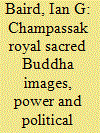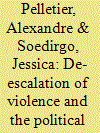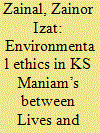|
|
|
Sort Order |
|
|
|
Items / Page
|
|
|
|
|
|
|
| Srl | Item |
| 1 |
ID:
157220


|
|
|
|
|
| Summary/Abstract |
What is the relationship between Buddha images and the legitimization of political power over space? What understandings exist amongst royals concerning regaining spatial power associated with Buddha images? This article considers these questions with a particular focus on the Champassak Royal House, a royal family that was originally spatially constituted through the territorial control it had over present-day southern Laos and some neighbouring areas. To do this, the article draws upon two case studies, one centred on an important Buddha image in the 18th century, the other more contemporary and linked to Buddha images and exiled members of the Champassak Royal House. Buddha images have long played an important role in constituting and defining sacred geographies, and thus political power, in Champassak, as has similarly been the case in other parts of mainland Southeast Asia.
|
|
|
|
|
|
|
|
|
|
|
|
|
|
|
|
| 2 |
ID:
157222


|
|
|
|
|
| Summary/Abstract |
During his term of presidency (2004–2014), Indonesian President Susilo Bambang Yudhoyono (SBY) was heavily criticised for excessive use of English when making formal speeches in Indonesian, a linguistic phenomenon of mixing languages known as code-switching. Such criticisms reflect an ambivalence towards English that is influenced by nationalistic sentiment. By analysing a range of presidential speeches, we reveal that SBY’s code-switching was highly variable but not random, and depended largely on particular audiences, topics and domains. Despite certain instances where SBY avoided English code-switching, which suggests nationalistic self-positioning, findings show SBY frequently engaged in code-switching as part of his communicative repertoire. We argue that SBY used code-switching as part of his pragmatic competence to strategically enhance his credibility and authority. This demonstrates how English code-switching can be used strategically to enhance a leader’s political discourse in an Indonesian context.
|
|
|
|
|
|
|
|
|
|
|
|
|
|
|
|
| 3 |
ID:
157218


|
|
|
|
|
| Summary/Abstract |
Why do some episodes of violence escalate while others do not? While the micro-foundations of communal violence are well known, the micro-foundations of “peace mongering” are under-studied. This article studies attempts at de-escalating violence in Maluku, Indonesia. It finds that the actions of non-state elites are crucial for de-escalating conflict. However, the efficacy of peace-oriented action is largely determined by the presence or absence of “institutionalized de-escalation systems.” These institutions are directly geared towards conflict prevention and de-escalation and are distinct from inter-communal associational and business networks. While attitudes favourable to peace and stability are found in many post-conflict contexts, they do not always translate into the emergence of institutionalized de-escalation systems. This article argues that such systems emerge only where a specific political economy of peace exists. In such an economy, some non-state actors see an opportunity in peace mongering to fulfill their material and social interests.
|
|
|
|
|
|
|
|
|
|
|
|
|
|
|
|
| 4 |
ID:
157219


|
|
|
|
|
| Summary/Abstract |
Criticism on Malaysian literature in English rarely addresses environmental concerns and in this article I attempt to redress this by examining two contemporary Malaysian novels in English, KS Maniam’s (2003) Between Lives and Yang-May Ooi’s (1998) The Flame Tree. This article investigates some of the environmental ethics suggested by these Malaysian writers, based on four important arguments for “doing” environmental ethics: duty, character, relationships and rights. Analyses of the novels reveal an environmental ethics that seems to revolve around the profound ideas that we are part of the environment, that the future of the environment hinges on actions and knowledge to ensure its sustainability and that action is derived from a sense of shared duty and activism and having good character and relationships. Also revealed in these texts is the commendable influence of religious beliefs and traditions and how these are interwoven with current ethical concerns about the environment and its sustainability.
|
|
|
|
|
|
|
|
|
|
|
|
|
|
|
|
| 5 |
ID:
157221


|
|
|
|
|
| Summary/Abstract |
This article discusses the nature of Islamic philanthropy and social services in the context of the plurality of Indonesian society by looking at the early development of Muhammadiyah’s charitable activities, known as Penolong Kesengsaraan Umum or by the acronym PKU (Assistance for the Relief of Public Suffering). This article asserts that PKU took an inclusive approach to humanitarian issues in providing social services to underprivileged groups and that this was claimed as being ‘without discrimination of religion and race or group.’ It analyses the ‘bridging’ and ‘bonding’ aspects of faith-based philanthropy as social capital and questions how it was that PKU could formulate inclusive ideas that underpin its vision and activities and that bolster Muhammadiyah’s label as a civil society organisation. Even though the ideas were overtaken at the end of the Dutch colonial period, the potential for an inclusive principle remained in place.
|
|
|
|
|
|
|
|
|
|
|
|
|
|
|
|
| 6 |
ID:
157223


|
|
|
|
|
| Summary/Abstract |
Lao nationalism is usually thought to have emerged only at the end of the French colonial period during the Lao Renovation Movement (1941–1945), placing its origins much later than elsewhere in Southeast Asia. Yet when surveying Lao palm leaf manuscripts, it is evident that Lao scribes were writing in uniquely modern ways about themselves and others as early as 1890, three years prior to French colonization. They wrote in response to recent upheavals seen in the north amidst the Ho Wars (1869–1889) and the related migrations from south China during the mid- to late 19th century, and their accounts included highly-charged descriptions of newly arrived ethnic groups that subtly redefined what it meant to be Lao. These developments suggest an earlier origin to Lao ethnic nationalism at the turn of the century, which anticipated the later, more intense changes to appear in the French colonial era (1893–1945). Emphasis is placed on significant connections between the precolonial and colonial periods.
|
|
|
|
|
|
|
|
|
|
|
|
|
|
|
|
|
|
|
|
|